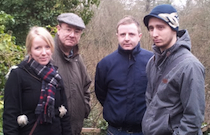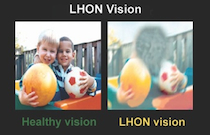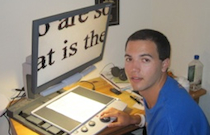Leber Hereditary Optic Neuropathy (LHON)
March 2012The challenges of a dramatically under-diagnosed rare disease
 In June 2011, Russell Wheeler’s twenty-four year old son, Richard, began to experience blurring of his vision. An examination revealed a swollen optic nerve thought to be caused by a viral infection. Over the following weeks Richard’s eyesight deteriorated and, after a series of further tests, the possibility of Leber Hereditary Optic Neuropathy (LHON) was raised. LHON is a genetic disease, inherited through the mother, which causes rapid loss of central vision.
In June 2011, Russell Wheeler’s twenty-four year old son, Richard, began to experience blurring of his vision. An examination revealed a swollen optic nerve thought to be caused by a viral infection. Over the following weeks Richard’s eyesight deteriorated and, after a series of further tests, the possibility of Leber Hereditary Optic Neuropathy (LHON) was raised. LHON is a genetic disease, inherited through the mother, which causes rapid loss of central vision.
Russell explains, ”None of us had heard of this condition and information and advice was difficult to come by. The local consultants had never encountered LHON and were working from information gleaned from the Internet.” A leading specialist offered little comfort when he confirmed that there was no cure and Richard would just have to get used to his new status as a blind person.
 “Of course, there are worse afflictions than becoming blind but it is still a devastating blow and there is the additional worry that Richard’s brother, sister or mother could convert to being symptomatic without warning,” Russell says.
“Of course, there are worse afflictions than becoming blind but it is still a devastating blow and there is the additional worry that Richard’s brother, sister or mother could convert to being symptomatic without warning,” Russell says.
Both father and son feel that though medical professionals are sympathetic, they are able to offer very little apart from information, which is generally more widely and comprehensively available over the Internet. Russell says, “We are left with social services and charities – the Royal National Institute for the Blind for example – to offer practical support. One of the few positive aspects has been the high calibre and dedication of some of these workers, operating with very limited resources.”
 The Wheelers’ primary source of information and connection with people in a similar situation is via a Facebook support group and the website www. lhon.org dedicated to making information on developments and research into new treatments etc. as widely available as possible.
The Wheelers’ primary source of information and connection with people in a similar situation is via a Facebook support group and the website www. lhon.org dedicated to making information on developments and research into new treatments etc. as widely available as possible.
Though actively supporting and contributing to this effort, Russell feels that this alone is not enough, especially for others who are encountering this condition for the first time. He explains, “None of this sort of information has been forthcoming from any of the professionals we have met, not even ‘experts’ in the condition, and we are very much left to fend for ourselves.”
Until recently LHON was considered to be without hope of treatment or cure so it was typical for people with LHON to not see a medical practitioner for several years – there didn’t seem to be any point. As Russell points out, “They just get on with their lives.”
“Consequently,” Russell suggests, “there is no great demand for support groups etc. because the purpose of such a group is not well-defined. The people most likely to benefit have never heard of the condition and don’t even know they have it.”
Therefore Russell feels the most immediate concern is the need to increase awareness and knowledge about the condition among health professionals as well as the patient community. Increased awareness will hopefully lead to more funding for research. “Although LHON is an orphan disease it shares many characteristics with other conditions and there is likely to be considerable synergy in making sure research is conducted in a collaborative manner.”
Recently two orphan medicinal products have been designated for LHON. One of them is a gene therapy submitted by the Institut de la Vision, France, which was granted orphan drug designation in 2011. These are the first signs of hope for a potential future treatment.
This article was first published in the April 2012 issue of the EURORDIS newsletter
Author: Irene Palko
Photo credits: © Alethea Wheeler & www.lhon.org
